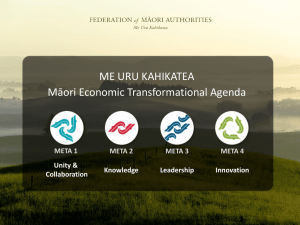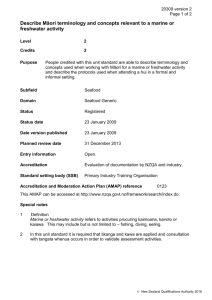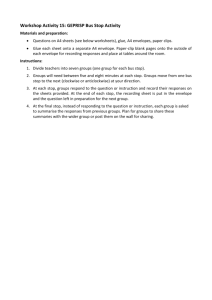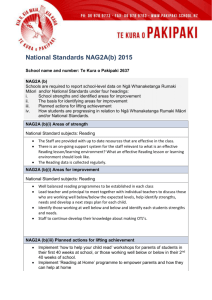Kāinga Whenua Infrastructure Grant Funding
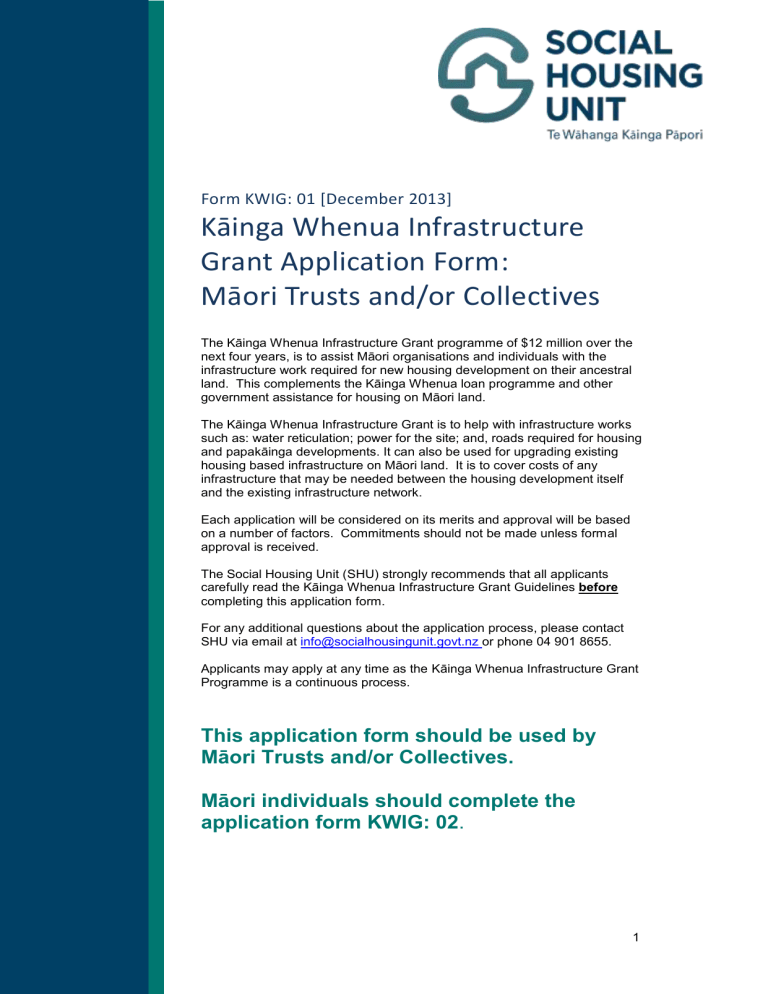
Form KWIG: 01 [December 2013]
Kāinga Whenua Infrastructure
Grant Application Form:
Māori Trusts and/or Collectives
The Kāinga Whenua Infrastructure Grant programme of $12 million over the next four years, is to assist Māori organisations and individuals with the infrastructure work required for new housing development on their ancestral land. This complements the Kāinga Whenua loan programme and other government assistance for housing on Māori land.
The Kāinga Whenua Infrastructure Grant is to help with infrastructure works such as: water reticulation; power for the site; and, roads required for housing and papakāinga developments. It can also be used for upgrading existing housing based infrastructure on Māori land. It is to cover costs of any infrastructure that may be needed between the housing development itself and the existing infrastructure network.
Each application will be considered on its merits and approval will be based on a number of factors. Commitments should not be made unless formal approval is received.
The Social Housing Unit (SHU) strongly recommends that all applicants carefully read the Kāinga Whenua Infrastructure Grant Guidelines before completing this application form.
For any additional questions about the application process, please contact
SHU via email at info@socialhousingunit.govt.nz or phone 04 901 8655.
Applicants may apply at any time as the Kāinga Whenua Infrastructure Grant
Programme is a continuous process.
This application form should be used by
Māori Trusts and/or Collectives.
Māori individuals should complete the application form KWIG: 02
.
1
Organisational Information
Please complete the following:
Organisation
Application contact
(name and title)
Contact telephone
Contact email
Physical address
Postal address
( )
What type of organisation are you?
(Registered Charity, Company, other?)
Purpose
Kāinga Whenua Infrastructure Grants are available for works on Māori customary and Māori freehold land (or other land explicitly accepted and agreed to as being Māori land). Where the land proposed for the housing development was received by iwi or hāpu as part of a Treaty settlement, even though it may be classed as general land, a grant may be approved to the extent that it supports the development of social housing.
The principle objective is to support the development of social (and related affordable housing) on
M āori land. We recognise that there may be occasions when the housing development on any approved general land may include some commercial housing development. On these occasions, we will consider an infrastructure grant for the proportion of the total costs that can be reasonably applied to the social housing component only.
Please complete this application form alongside reading the Kāinga Whenua Infrastructure
Grants Guidelines.
2
Section 1: Eligibility
Note Māori collectives and/or trusts may be eligible to apply for a Kāinga Whenua Infrastructure
Grant to support current or future housing development on Māori land. Priority will be given to those who also have a Kāinga Whenua loan approved or pre-approved, and where concurrent infrastructure works are necessary as a condition of the loan, or for house building to start (including related to a
Pūtea Māori proposal)
1.1
Organisational Eligibility
1.1.a What type of organisation are you:
Yes No
Māori company
Māori trust (eg pūtea trust, whānau trust, ahu whenua trust, whenua topu trust, and/or kai tiaki trust)
Other type of Māori organisation or collective
If other, please specify
1.1.b Is your organisation currently involved with the provision of social and affordable housing or if not does it intend to be in the future
1.1 Required documents:
Brief company profile.
Constitution or trust deed (as applicable) including details of a p ūtea trust, whānau trust, ahu whenua trust, whenua topu trust, and/or kai tiaki trust, legal existence.
3
Note Kāinga Whenua Infrastructure Grants are available for works on Māori customary and Māori freehold land (or other land explicitly accepted and agreed to as being Māori land). Where the land proposed for the housing development was received by iwi or hāpu as part of a Treaty settlement, even though it may be classed as general land, a grant may be approved to the extent that it supports the development of social housing.
1.2
Land Eligibility
1.2.a What type/s of land will your project utilise?
Yes No
M āori customary, freehold or reserve land
General land
1.2.b If Māori customary, freehold or reserve land: Please provide the Title Reference and location of Māori land of proposed build (please be as accurate as possible):
Affiliated Hapu and Iwi of Land Block
1.2.c Was the general title land re ceived by iwi or hāpu as part of a
Treaty settlement?
Yes No
1.2.d If the ans wer to question 1.2.c is ‘No’, you are Ineligible to apply for a Kāinga Whenua
Infrastructure Grant
If the answer to question 1.2.c is ‘Yes’, please provide details below
Affiliated Hapu and Iwi of Land Block
4
1.2.e Do you have authority/right of occupancy (unfettered access) to undertake the infrastructure works and proposed housing development?
If yes, please provide details
Yes No
1.2.f Is the land which this infrastructure application relates to, able to be used for the provision of social and/or affordable housing and is it the intention of your organisation to do so, either now or in the future
1.2.g If the land is General land received by iwi or hāpu as part of a
Treaty settlement , the details of the land holding and a declaration stating that the proposed development is for social housing
Yes No
1.2 Required documents:
Evidence of land ownership (e.g. land titles, block descriptions, M consents from individual owners of multiple-owned land āori Land Court records, or
Evidence of right of occupancy and agreement of the landowners/trustees to undertake the infrastructure works
5
Section 2: Links with Other Funding Approvals
Note Consideration of what fixed infrastructure costs are included in a Kāinga Whenua (or other) loan approval, or Pūtea Māori grant, will be taken into account when assessing the level of infrastructure grant. Generally it is expected that a Kāinga Whenua loan or Pūtea Māori grant may cover the following costs as part of a standard housing development:
Septic tank
Stormwater drainage
Water/water tank
Driveway/road from block boundary or site to house
Phone & power from block boundary or site to house
Other infrastructure costs, beyond these standard items may be considered for an KWIG grant
2.1
Related Approvals and Applications
2.1.a Have you applied for or do you have an approved Kāinga
Whenua Loan for this housing project?
2.1.b If the answer to 2.
1.a is ‘yes’, are the infrastructure works from this application necessary as a condition of a Kāinga Whenua loan you have applied for?
2.1.c Have you ever applied for or do you have an approved Social
Housing Fund and/or Pūtea Māori grant for this housing project?
Yes
2.1.d Have you applied for or do you have an approved Kāinga
Whenua Project Capability or Proposal Development Grant in relation to this project?
2.1.e Have you applied for or do you have an approved Te Puni Kōkiri grant in relation to this project?
If you have answered ‘yes’ to any of the above, please provide details below:
No
Include application or approval reference numbers, the status of applications (eg approved, conditionally approved, awaiting decision) and any conditions in relation to infrastructure costs.
2.1 Required documents:
Any relevant supporting documents pertaining to related approvals and applications identified above e.g. copies of applications, approvals, offers of finance etc
6
2.2
Consent
2.2.a Do you consent to the Social Housing Unit contacting Kiwibank and/or Housing New Zealand and/or Te Puni Kōkiri in relation to your application, for the purpose of ascertaining the amount of
Kainga Whenua loan funding that your project is receiving or will received in future?
2.2.b Do you consent the Social Housing Unit relying on information and details provided to it previously in relation to this project and past Pūtea Māori or Social Housing Fund applications?
Yes No
2.3
Related Infrastructure Costs
2.3.a Does your Kāinga Whenua Loan, Social Housing Fund and/or
Pūtea Māori grant (or other sources) include funding for any of the following infrastructure works:
Sewerage connection or septic tanks or stormwater
Yes No
Water tanks or water connection
Electricity, gas connections or telecom connections
Roading, drives, retaining walls, site preparation, fencing landscaping
Other (please specify below)
2.3.b If you have answered ‘yes” to any options under 2.3.a, please provide details below:
Include any conditional requirements such as the need for a Kāinga Whenua Infrastructure Grant to cover the cost of connecting utilities or building roads between the housing development side and the network.
2.3 Required documents:
Copies of loan approvals, conditional loan approvals and details of other related infrastructure works and how they will be paid for
7
Section 3: Infrastructure Project Details
Note Other infrastructure costs, beyond the standard house construction items within a development site may be considered for an KWIG grant, including:
Establishment of a more extensive roadway to the block from main public access way;
Additional fencing of the block when required as part of house planning consent;
Significant or long phone and power connection lines between the development site and the network; and,
Complex systems (such as integrated sewerage systems) which will cost more than an individual house builder would generally expect to pay.
In the case of trusts and/or collectives, the priority will be to fund infrastructure works that aim to achieve efficient and multiple future housing development.
At this stage, it is not our intention to prescribe fixed cost limits, as we know that every housing development is different. As a guide we expect grant contributions to be within the following range
(excluding GST):
For one house – up to $70,000
For two houses – up to $130,000
For each subsequent house (from the second house) – up to $50,000
3.1
Infrastructure Project Summary
3.1.a What is the name of your infrastructure project?
3.1.b Please describe the infrastructure works subject to this application (including start and completion dates)
8
3.2
What infrastructure activities are you seeking funding for?
3.2.a
Eligible Activities
Amount
Required
New Existing
Sewerage connection or septic tanks or stormwater within the development site
$
Water tanks or water connection within the development site $
Electricity, gas or telecom connections within the development site
Roading, drives, retaining walls, site preparation, fencing landscaping within the development site
Cost of connecting utilities (electric, gas, telecom, water) between the development site and the network)
Cost of roading, drives, retaining walls, site preparation, fencing landscaping between the development site and the boundary
Sewerage, water, stormwater works for a larger future housing development
$
$
$
$
$
Other (please specify) $
Total Amount Required $
Total Amount Requested $
Note: On ly expenses incurred after written approval of a Kāinga Whenua Infrastructure grant are eligible.
3.2.b If you have specified other costs in the table above, please give detail to what these costs cover
9
Note Applications are required to include two or more quotations for the proposed infrastructure work from reputable, licenced and qualified contractors and suppliers. Please do not accept any quotation until the grant is approved. We will provide further information about accepting quotations and payments at the time of approval. As a general rule, we expect you to select the lowest quotation received or provide additional information to justify why a higher quotation is preferred.
3.3
Quotations for work
3.3.a Have you received at least two quotations for each of the proposed infrastructure work activities?
Yes
3.3.b Do you agree to accept the lowest quotation?
3.3.c If you answered ‘no’ to 2.4.b, please provide any further information to justify why a higher quotation should be accepted
No
3.3 Required documents:
Copies of quotations received for the infrastructure work. Quotations must be from reputable, licenced, registered and/or qualified contractors/suppliers. Ideally, evidence of their suitability should also be provided
10
Section 4: Housing Project Details
Note The principle objective is to support the development of social (and related affordable housing) on Maori land. You are expected to demonstrate capacity and planning to commence infrastructure works within six months of the Kāinga Whenua Infrastructure Grant approval.
In the case of trusts and/or collectives, the following will be required in addition to the above:
Appropriate business plan and cashflow viability for the housing project, approved by the Trustees
(or governance body representing the Trust and/or landowners)
If the land is General land received by iwi or hāpu as part of a Treaty settlement, the details of the land holding and a declaration stating that the proposed development is for social housing
4.1
Housing Focus
4.1.a Please describe how the infrastructure works subject to this application supports the development (or future development) of social (and related affordable housing) on Maori land
Please include details of building staging and future plans.
4.1.b Which of the following best describes the type of housing to be provided:
New build only
Redevelopment (i.e. purchase of existing units and construction of additional units)
Yes No
11
4.1.c Please complete the table below to indicate the tenure mix of the housing to be provided.
Please note that applicants should complete this table in respect of all housing to be provided through the project
No. units by bedroom. Tenure type
Social rental
No. units
Affordable rental
Private rental
Assisted home ownership x 1 bedroom x 2 bedroom x 3 bedroom x 4(+) bedrooms x 1 bedroom x 2 bedroom x 3 bedroom x 4(+) bedrooms x 1 bedroom x 2 bedroom x 3 bedroom
Private home ownership
Total number of units to be provided x 4(+) bedrooms x 1 bedroom x 2 bedroom x 3 bedroom x 4(+) bedrooms x 1 bedroom x 2 bedroom x 3 bedroom x 4(+) bedrooms
12
4.1.d Other information – what else do you think we need to know in order to understand your proposed housing project?
4.1 Required documents:
A summary project proposal, including: o Indicative project cost, funding and cashflow projections for future housing to be built o High level building specifications o Build phasing plans o Identification of site specific concerns, constraints or risks o Future infrastructure requirements o Any additional information you believe is necessary in respect of project location, tenure mix, housing type, zoning, legal descriptions etc.
A pproved house plans, papakāinga master planning or resource/planning consent.
4.2
Project Readiness
4.2.a In the box below, please state your housing project(s) expected start date(s)
(i.e. when construction will commence for new build properties, or the settlement date for purchased properties, or when the infrastructure works will commence);
13
4.2.b In the box below please state your project(s) expected completion date(s)
(e.g. when do you expect to have a code of compliance certificate(s) issued by)
4.2.c Are you aware of any site issues that may delay or prevent completion of the project?
Yes
4.2.d If the answer to question 4.2.c is ‘ Yes ’, please provide further information in the box below, including timeframes for resolution of these issues:
No
Note: this includes land ownership and property issues, such as any issues relating to site acquisition, subdivision approval, surveying, title, ownership, site contamination etc, as well as indicative timeframes for resolution of any issues)
4.2 Required documents:
Planning consents, build contracts etc.
14
4.3
Capacity
4.3.a Do you have the capacity and planning to commence your housing project within six months of the Kāinga Whenua
Infrastructure Grant approval?
Yes
4.3.b If you answered ‘yes’ to 4.1.a, please provide supporting information below
No
Yes
4.3.c Do you have an appropriate business plan and/or cashflow viability for the housing project, approved by the Trustees (or governance body representing the Trust and/or landowners)?
4.3.d If you answered ‘yes’ to 4.3.c, please provide further information in the box below
No
4.3 Required documents:
Business plan, cashflow viability for the housing project, evidence of formal approval by the
Trustees or governing body
15
Section 5: Declaration and Signoff
Note A declaration is required to confirm that insufficient cash or assets exist to finance the infrastructure without a grant, and that the planned housing construction would not otherwise be possible.
Applicant Declaration
I …………………………………[name] being authorised by ………………………………[name of applicant organisation] to make this application on behalf of the organisation declare that:
the information supplied is true and correct to the best of my/our knowledge
I am authorised by the applicant M āori organisation to make this application on behalf of the organisation
the organisation has insufficient cash or assets to finance the proposed infrastructure works without this grant, and that the planned housing construction would not otherwise be possible.
Signature: ___________________________________________________________
Title/Position:
Date:
___________________________________________________________
___________________________________________________________
Countersigned by Trustee: _________________ Name [please print] _____________________
How do I apply?
Please complete and sign this form. With any supporting documents (see the next checklist) you may post the application to:
K āinga Whenua Infrastructure Grant Application
Social Housing Unit.
Te W āhanga Kāinga Pāpori
Level 5, 15 Stout Street
PO Box 1473, Wellington 6143,
New Zealand
Or you may scan your signed application form (all pages and supporting documents) and email to: info@socialhousingunit.govt.nz
16
Kāinga Whenua Infrastructure Grant Funding Application Check-list
This check-list must be completed and submitted as part of your application for funding. Please tick the appropriate boxes in the tables below to indicate that you have provided the required supporting documentation.
Applicants must supply all of the information requested
Section
1.1
1.2
2.1
2.3
3.3
4.1
4.2
4.3
5
Required documentation
Brief company profile
Constitution or trust deed (as applicable) including details of a p ūtea trust, wh ānau trust, ahu whenua trust, whenua topu trust, and/or kai tiaki trust, legal existence
Evidence of land ownership (e.g. land titles, block descriptions, M āori
Land Court records, or consents from individual owners of multipleowned land
Evidence of right of occupancy and agreement of the landowners/trustees to undertake the infrastructure works
Any relevant supporting documents pertaining to related approvals and applications identified above e.g. copies of applications, approvals, offers of finance etc.
Copies of loan approvals, conditional loan approvals and details of other related infrastructure works and how they will be paid for.
Copies of quotations received for the infrastructure work. Quotations must be from reputable, licenced, registered and/or qualified contractors/suppliers. Ideally, evidence of their suitability should also be provided.
A summary project proposal, including: o Indicative project cost, funding and cashflow projections for future housing to be built o High level building specifications o Build phasing plans o Identification of site specific concerns, constraints or risks o Future infrastructure requirements o Any additional information you believe is necessary in respect of project location, tenure mix, housing type, zoning, legal descriptions etc.
A pproved house plans, papakāinga master planning or resource/planning consent.
Planning consents, build contracts etc.
Business plan, cashflow viability for the housing project, evidence of formal approval by the Trustees or governing body.
Declaration
Tick to confirm
17
